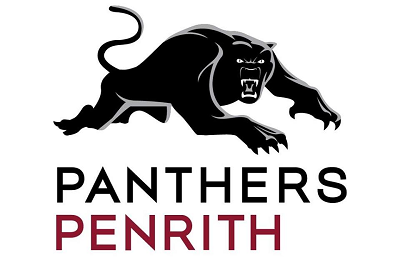Crown Jewels 1982-83
Penrith Cricket Club | May 03, 2024
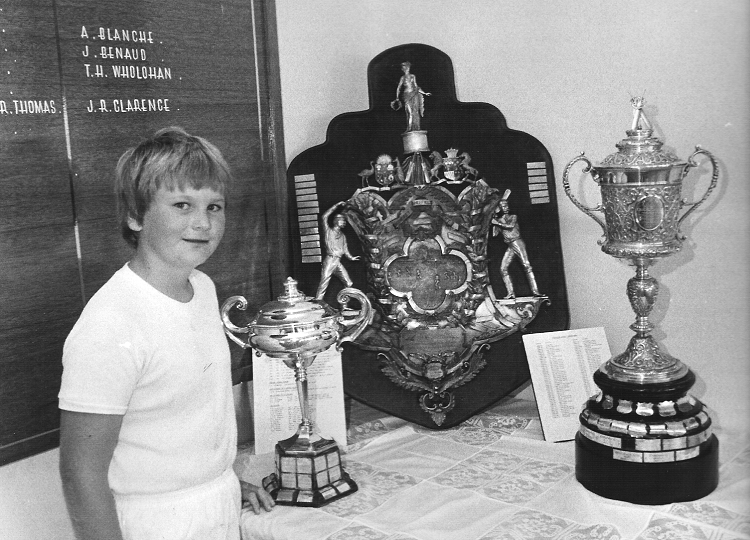
Happy 10th Anniversary! If it had been a wedding celebration it would have demanded tin, but the Club’s celebratory Decade in Grade brought home the silverware, the Crown Jewels of the NSWCA, the Sydney Smith Cup for winning the Club Championship and the Belvedere Cup for winning the First Grade Premiership, capping off the Club’s finest season in its short history.
There was more good news: Second Grade Semi-finalists, Third Grade Semi-finalists and Fourth Grade a win away from a Semi-final berth. Firsts won Team of the Year in The Sydney Morning Herald cricket awards. And, there were near misses: Graeme Beard and Ken Hall tied for third in the Herald’s Player of the Year; the Green Shield’s five wins and 30 points, one win from the Final, was the Club’s best result in this Competition.
The victorious Firsts were feted at a Penrith Council Civic Reception and at the Leagues Club. The Club had a new President, Bill Ball, who said: “When one considers the Club’s progress since inception, there has been an obvious steady climb … this, I feel reflects the dedication of past and present committees”. There was a new sponsor, Swire Travel, and its representative Frank Clark, Deputy President to Bill Ball, was honoured with an Order of Australia Medal for services to the community and to sport.
There were two new matches in the schedule, both played at Howell, both it was hoped would be annual contests: Past versus Present and, a Club XI played a team from the NSW Women’s Cricket Association.
Outstanding performance was further rewarded by the advent of The Terry Heidtmann Awards for Player of the Round. Among the winners was Barry Coad who scored 651 runs in the season in Thirds and Seconds.
There was good news for the youngest players disadvantaged by turf inexperience when Penrith Council agreed to provide the Club with a new ground at Werrington, to be known as Rance Oval. Council would receive financial assistance from Department of Sport and Recreation’s Ground Improvement Fund and Funds from the Club. The new ground would allow the Club to enter a Fifth Grade team into the NSWCA competition.
Penrith Panthers are a proud sponsor of the Penrith Cricket Club
The Annual Report carried an ad on page 34: “Opening soon, St Marys Indoor Cricket Centre, See You Soon, Greg Gavin, John Rennie”. The centre would play a vital role in the Club’s Junior Development Squads of the 90s. Development had a downside of sorts—opposing Clubs were often quick to try to pilfer our most promising, Nathan Bracken being one.
The season was a smorgasbord for the statisticians: a total of 18 milestones were established throughout the Grades—two individual Highest Scores, one Highest Average, one Highest Aggregate, two Most Wickets, one Most Dismissals for a Wicket-keeper and, eleven Partnership Records.
And, there was great interest among statisticians when the extraordinary bowling milestone of Geoff Davies (61 wickets) came under challenge from the very talented fast bowler Graeme Pitty. As it was, Graeme Beard set a new record for the bowling average, and another record when he became the first First Grader to take ten wickets in a match. And, another first was the double fifty-wicket season of Pitty (59) and Beard (57).
In the Poidevin-Gray, the Club’s two Country imports, Trevor Bayliss and Brian Wood, established a batting record against Sydney that will never be surpassed. Manager Bob Clarence: “Having seen almost every PG match played by the Club I would have to say this was the best ever”.
First Grade (1st-84pts)
This was a truly amazing performance, the team’s points score being a margin of 30 clear of their nearest rivals. Their 12 consecutive wins were a record for the Club in any Grade, and would take some beating in the summers to come. In a sensible move, the NSWCA had decided that all Finals were to be at neutral grounds. Penrith’s Semi-final was against Randwick at the Uni of NSW’s Village Green but a wash-out propelled the Club into the Final against Bankstown at Hurstville Oval.
When Final Day arrived it was weather fine, track good, and Ian Davis won the toss and batted. The Bankstown pace pair McKirdy and Sullivan (Tim, who had formerly played with Penrith) extracted some movement, making the going tough. In the top order Greg Monaghan made a solid 30 and Graeme Beard top scored with 45. A late order fight-back by Greg Gavin (21 not out) and Gary Donlan (19) got Penrith to 183, not a great score but it would still take some getting considering the slow outfield and, a pitch which proved more helpful to the bowlers than anticipated. Bankstown had one hour to bat, and Penrith gained a slight advantage when, with sheer pace, Graeme Pitty claimed the prize wicket of International Steve Smith, trapped in front. You beauty, one for next-to-none! At stumps Bankstown were 1/29.
On day two Penrith obviously needed quick wickets and Graeme Beard delivered, bowling Mark Waugh. Bankstown 2/35. A solid partnership between Crowfoot and Rod Bower (later to join Penrith) turned the match in Bankstown’s favour until, with the total 59, Bower was brilliantly caught by Ian Davis low down, one-handed to his right at first slip off Ken Hall. In the next over Beard got Crowfoot, when Cobcroft miraculously clutched a ferocious pull which hit him in the stomach. Ken Hall took two more quick wickets and Bankstown had slumped to 6/65. Then Hall got another and, at lunch, Bankstown were 7/86.
After the break, skipper Bob Vidler fought hard to get Bankstown back into the game but his stubborn partnership with McKirdy ended with a run out. Pitty then bowled Les Andrews (who had returned to Bankstown after his successful stint with Penrith) and, after a flurry of runs from Vidler, last man Sullivan was caught by Hall from the bowling of Beard. Bankstown was out for 140. Ian Davis lauded his team, among them Greg Monaghan, “a great team man”; Trevor Bayliss, ”the find of the season” and, “hope he continues with the same success in the future”; Graeme Beard, “still the best all round cricketer in Australia”; Graeme Pitty, “genuine pace, a match winner on a number of occasions”.
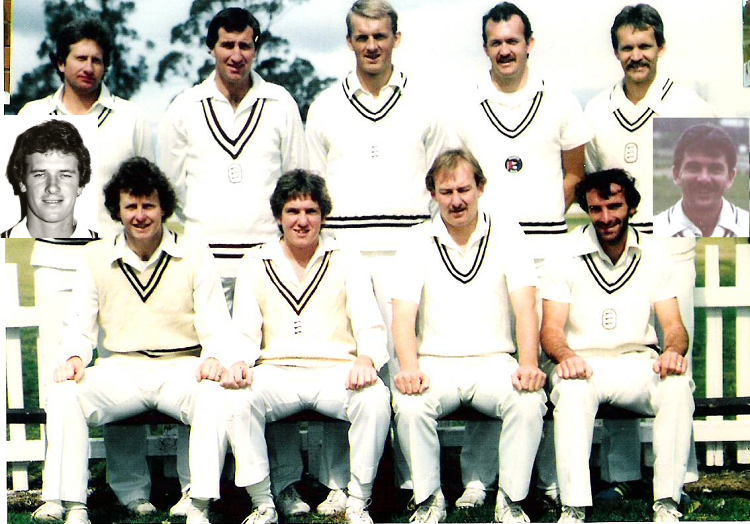
Our second First Grade premiership team:
(Back) Graeme Beard, Ken Hall, Ian Monaghan, Graeme Pitty, Greg Monaghan;
(Front) Greg Gavin, Trevor Bayliss, Ian Davis (c), Graeme Thorpe;
(Insets) Gary Donlan, Malcolm Cobcroft.
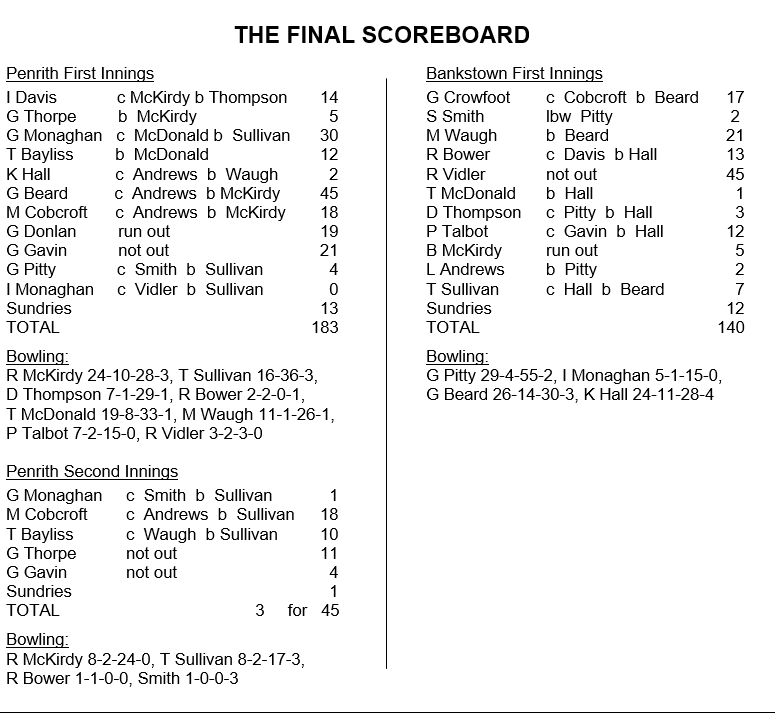
Highlights
- Four batsmen scored the magic 500 runs: Ian Davis, 659 @ 38.76, including 179 v Uni of NSW, 124 v Cumberland and 74* v Waverley; Trevor Bayliss scored 526 runs @ 32.88, including 120 v Sydney Uni and 57 v Sydney; Graeme Thorpe scored 526 runs @ 26.3, including 96 v Mosman and 81 v North Sydney; Ken Hall scored 514 runs @ 39.54, including 101 v Sydney, 58 v Randwick, 52 v Bankstown, 52* v North Sydney.
- Malcolm Cobcroft scored 499 runs @ 33.27, including 89 v Mosman, 81 v Wests
- Greg Monaghan scored 491 runs @ 25.84, including 67 v Balmain, 55 v Sydney
- Graeme Beard scored 360 runs @ 32.73, including 84 v Wests and 56* v Cumberland
- Graeme Pitty took 59 wickets @ 15.54, including 5/39 and 6/31 v Manly (11 wickets in match)
- Graeme Beard took 57 wickets @ 11.26, including 6/41 and 6/14 v Balmain (12 wickets in match)
- Ken Hall took 33 wickets @ 14.33, including 5/24 v Sydney Uni and joined the 200 Club (228 wickets)
- Gary Donlan took 21 wickets @ 21.19, including 5/45 v St George
- Ian Monaghan took 18 wickets @ 16.28, including 6/20 v North Sydney, 5/34 v Sydney
- Club and Grade Records were set by: Ian Davis, Highest Score 179 v Uni of NSW; Greg Gavin, Most Dismissals for a Wicket-keeper, 38
- Graeme Beard and Mal Cobcroft shared a Grade Record Sixth-wicket Partnership of 128
- A unique team record: played 17, won three outright, won ten first, lost one first, drew three
Runs for 4287 Wickets lost 132, Average 32.48
Runs against 3253 Wickets lost 197 Average 16.51
Second Grade (3rd-58)
‘The Achilles heel of the Club’ … not so now! But at Christmas, and settled into the usual mid-table slot, the gloomy past did seem hauntingly threatening. The Captain, Bob Clarence, takes up the fairytale: “But the spirit was tremendous. There was talk of a Semis spot … impossible … we’re 18 points from fourth and six rounds to go. We went out and thrashed North Sydney. This was the start of our run.
"So, to the last round, and only four points from fourth-placed Balmain and eight points from second. An outright will give us a good chance, but (our opponents) Wests have been going well … it was no contest. We coasted to our first outright of the season”. Wests were dismissed for 99 (Tom Shiner 6/60) and Penrith declared at 7/136 (Grahame Price 66). Wests were then dismissed for 200 (Ray Hudswell 5/48) and Penrith, needing 164, were 3/166 (Wayne Holt 50*). Clarence: “We waited as the other results came in … you beauty! Third place, our first-ever Semi-final”. The 58 points assisted greatly in the winning of the Club Championship.
The Semi-final against Northern District was played at Waitara. With ND 2/91 rain washed out play and they progressed to the Final. Clarence again: “Disappointment … the rain had done what no opponent had in six straight games”.
Individually, bowlers Tom Shiner and Ray Hudswell both broke the most-wickets-in-a-season record (37, set by Bob Clarence the season before) and were inspirational in the run to the Semis. Two Grade Record Partnerships were set: Grahame Price and Scott Dickson put on 91 for the sixth wicket, Ian Monaghan and Tom Shiner put on 64 for the ninth wicket.
Highlights
- Brian Wood scored 469 runs @ 29.31, including 100* v North Sydney, 64 v Randwick, 61 v Manly, 50 v Cumberland; took 14 catches
- Wayne Holt scored 323 runs @ 29.36, including 57 v Sutherland
- Grahame Price scored 306 runs @ 23.54, including 74 v Northern District, 55 v Randwick
- Bob Clarence scored 294 runs @ 24.50, including 52 v Mosman, took 19 wickets @ 17.53, including 6/56 v Balmain
- Barry Coad in four innings scored 208 runs @ 69.33, including 103 v Sydney Uni, 97* v Sydney
- Tom Shiner took 46 wickets (new record) @ 13.26, including 6/28 v Bankstown, 6/41 v Manly
- Ray Hudswell took 39 wickets @ 13.26, including 5/11 v Sydney Uni, 5/43 v Mosman
- Mark Oliver took 26 wickets @ 21.42, including 6/58 v Bankstown, 5/89 v Sutherland, scored 228 runs @ 28.50
- Scott Dickson took 29 catches, made four stumpings, scored 165 runs @ 16.50
- Mark Gouldstone took 20 catches, mainly at short leg
Runs for: 3004 Wickets lost 124 Average 24.23
Runs against: 3486 Wickets taken 188 Average 18.54
Third Grade (3rd-58)
The enterprising Captain was Lawrie Renshall, the wicket-keeper. In round six against Randwick, Penrith scored 333 and when Randwick had tumbled to 7/106 Lawrie was overheard telling the Randwick skipper: “You blokes can’t win on the first innings, how about you declare and I’ll forfeit our second innings?” The great ‘con’ worked: Grahame Price’s tweaking off-spinners shattered Randwick, out for 160, outright win to Penrith.
In his season review, Renshall said: “Only the loss to Sydney Uni after Christmas prevented the team being Minor Premiers”. But Thirds were to suffer the same fate as Seconds, a Semi-final wash-out against the higher-placed Sydney Uni (4/128).
During the season Paul Thomas broke Peter Savage’s wicket-taking record (38) which had stood since 1974/75. Renshall: “A good year was had by ‘Thommo’ not only for his wicket tally (43) but also for his achievements with the bat (165 @ 20.06) and his alertness in the field (seven catches)”.
Ironically, Peter Savage equalled his old record. The overall strength of the bowling was obvious: 165 wickets taken @ 18.91. In the batting there were 17 scores in excess of fifty.
And, in a sign that the Club’s young talent was ever-maturing, there were three new Grade Record Partnerships set: Barry Coad and Nigel Kleinveldt 167 for the first, Barry Coad and Mark Betros 150 for the third and, Mike Gibson and Ray Eldridge 79 for the seventh. And, for Club members aware of a certain young cricketer’s later career in another round ball sport, there was this: “Mike Gibson’s brilliant fielding demonstrated that his all-round ability will take him to higher levels”.
Highlights
- Barry Coad scored 443 runs @ 34.08, including 102 v Randwick, 89 v Southern Districts, 71 v Bankstown, 67 v Macquarie Uni
- Wayne Holt in five innings scored 269 runs @ 67.25, including 131 v St George, 62* v Petersham
- Mike Gibson scored 308 runs @ 34.22, including 81 v Sutherland, 50 v Balmain, took 18 wickets @ 23.83
- Hugh McKay scored 373 runs @ 26.64, including 59 v Sutherland, 54 v Sydney
- Doug Evans scored 325 runs @ 21.67, including, 92 v Sydney Uni, 64 v Wests, took 19 wickets @ 25.89
- Rod Evans scored 299 runs @ 19.93, including 64 v Wests
- Paul Thomas took 43 wickets @ 16.47, including 6/30 v Sutherland, 5/30 v North Sydney, 5/44 v St George,
- Peter Savage took 38 wickets @ 17.00, including 5/33 v Southern Districts
Runs for: 3406 Wickets lost 145 Average 23.49
Runs against: 3120 Wickets taken 165 Average 18.91
Fourth Grade (7th-52)
The last round loss to Bankstown cost dearly, the team missing the Semis by just four points, but its ten wins eclipsed any previous effort. Captain Barry Clarence: “This was a side full of youth, talent and enthusiasm. Unfortunately, it was the inexperience of the team that eventually led to its faltering in the all-important last round. This was also reflected in some of the pressure games during the season”.
He also raised another aspect of the season that was not an uncommon negative in that era—“It should be noted that our interpretation of the rules was sometimes contrary to that of our opponents in matches where we didn’t have umpires, and that contributed to some of our losses”.
Darren ‘Soss’ Morris impressed Clarence: “On more than one occasion he put us in a winning position and with more experience and less enthusiasm running between the wickets will be a First Grade cricketer”. So did Michael Wholohan: “The smallest player with the biggest heart, the only player to score a century, arguably our hardest worker”. On and off the field, Clarence enjoyed the help of a couple of veterans too: “Trevor Wholohan, without whose help many functions would have been merely drinking sessions”; and Jon Llewelyn, “one of the Club’s most valuable cricketers who regained the mantle of highest career wicket-taker with 283”.
Highlights
- Darren Morris scored 398 runs @ 24.88, including 63 v St George, 62 v Bankstown and 53 v Northern District, took 40 wickets @ 13.45, including 5/32 v Waverley
- Mark Pratt scored 351 runs @ 23.40, including 77 v Wests, 57 v Northern District and 55 v Sydney
- Michael Wholohan scored 296 runs @ 19.73, including 106 v St George, took 10 catches and made two stumpings
- Peter Ryman scored 263 runs @ 23.91, including 65 v Petersham and 55 v Sutherland
- Tony Middlebrook scored 180 runs @ 30.00, including 67 v Sydney Uni and 54 v Mosman, took 14 wickets @ 29.57
- Tony Dukes took 34 wickets @ 23.79, including 5/47 v Wests and 5/49 v Petersham
- Jon Llewelyn took 38 wickets @ 18.21 and scored 50* v Southern Districts
Runs for: 3147 Wickets lost 152 Average 20.70
Runs against: 3655 Wickets taken 182 Average 20.08
Poidevin-Gray (7th)
One match result, the annihilation of Sydney, and the partnership statistics, explain a very strange, and disappointing series: only two wins from five matches.
Against Sydney, Penrith scored 1/377, Trevor Bayliss (record 204*) and Brian Wood (160*) setting a Club Record Second Wicket Partnership of 359, unbeaten, and believed to be a record for any Poidevin-Gray match. But a check of other season partnerships reveals that the best in the middle-order were ordinary, to say the least: 36 runs for the third, 14 runs for the fourth, and 15 runs for the fifth. The now seldom-heard adage that partnerships win matches was never truer.
Highlights
- Trevor Bayliss scored 339 runs (record) @ 84.75 (record)
- Brian Wood scored 238 runs @ 59.50
- Mark Oliver scored 131 runs @ 32.75, including 83 v Cumberland, took 16 wickets @ 17.50, including 6/31 v Petersham, 5/66 v Cumberland
- Mike Gibson scored 117 runs @ 29.25, including 67 v Petersham, took seven wickets @ 33.29
- Mark Gouldstone score 109 runs @ 27.25, including 66 v Cumberland
- Paul Thomas took six wickets @ 18.83, including 6/49 v Sydney
Green Shield (3rd)
Manager Rod Evans commented: “Five first innings wins, one wash-out and one loss very nearly saw us in our first Final. There can be little doubt that the wash-out against Petersham cost us a spot, but that’s cricket”. Names to remember were Kirk Yates, a batsman from Bathurst who’s “class was evident”, and local all-rounder Greg Sheens, “not a pretty player but certainly a very effective one”.
In a sign of the times, Evans perceptively drew attention to the changing style of the Green Shield game: “There is little doubt this is the game tailor-made for good, tight medium-pacers. It is a lot to ask of a leggie … many are a little wayward, you don’t want to chase big scores … you want them to bowl extremely tight … I feel sorry for Ken Pedreigh”.
Limited-overs cricket was in full swing at International level and there was no place in it for leg-spinners, who faced extinction. Of course, Shane Warne would change that, but only after a decade of demoralisation.
For the record, leggie Ken Pedreigh bowled four overs and took 0/11. Tight, but not tight enough in the swinging 80s.
Highlights
- Kirk Yates scored 320 runs @ 64.00, including 82* v Randwick, 81 v St George and 76 v Waverley
- Greg Sheens scored 239 runs @ 47.80, including 70* v Randwick and 62 v Waverley, took 16 wickets @ 14.44, including 4/56 v Randwick
- Andrew Williams scored 108 runs @ 36.00, including 51* v Sutherland
- Brett Howarth took 15 wickets @ 16.00, including 5/67 (30 overs) v St George
- Craig Culnane took 11 wickets @ 16.00, including 5/40 v Wests
Modern Heroes
Steve Small, known as “Jack”, came to Penrith as an established First Grader in season 1978/79, from the very successful, strong Bankstown Club. He really had everything the struggling then Nepean Club needed: attitude and heaps of talent, a strong training ethic and a hearty social instinct that immediately impacted on the rest of the First Grade and soon the Club.
He was a left-hand batsman whose technique for an opener was more Arnold Schwarzenegger than Mark Taylor but he had the eye of a hawk and the confidence to back his judgement, which generally tended towards “this bloke can’t bowl”. He was a smart gully field and, despite an old football injury restricting rotation in his left-shoulder, he fancied himself as a swing bowler … but railed that his captain would only let him loose at centre wicket practices!
When Jack arrived good things happened: Nepean became Penrith, Penrith Firsts won the Club’s first Premiership and Small was chosen to play for NSW, the first player selected from the Club to play First-class cricket. Jack would have played in Ian Davis’ second premiership winning team too but in that season he’d followed the lead of his good friend and team-mate Peter Clough and moved to Tasmania to try to further his Sheffield Shield career, which hadn’t progressed since that initial selection.
In that intervening period the great cricket split (World Series) had been resolved, tightening the selection process and Small found himself pitted against the likes of Rick McCosker. If he had a weakness to narrow the eye of a selector it might have been his failure to turn fifties into hundreds: (1978/79) 74 v Gordon, 62 v Randwick, 62 v Uni of NSW, 51 v Cumberland, 57* v Cumberland; (1979/80) 141 v Balmain, 100 v North Sydney, 92 v Northern District, 73 v St George, 56* v Mosman, 50* v Uni of NSW; (1980/81) 85 v Sydney, 53 v Mosman, 51 v Gordon; (1981/82) 122 v Randwick, 116 v Petersham, 110 v Bankstown, 72 v Wests, 68* v Sutherland.
Career: in four seasons, from 1978/79 to 1981/82 Steve Small scored 2387 runs @ 39.78; that’s an average of nearly 600 runs a season, a noteworthy performance in those days.
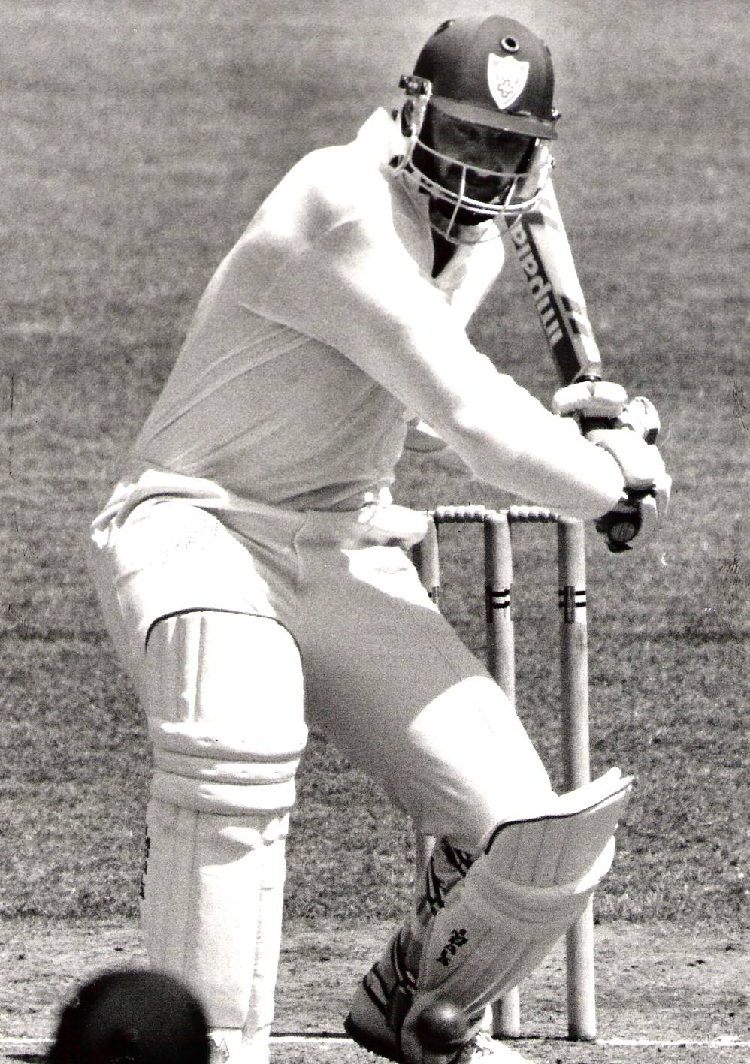
Ian Davis, a right-hand top order batsman, came to Penrith in season 1980/81 as a ‘former International’, but was still a current NSW Shield player and this restricted his Penrith appearances (eight matches in 1980/81, nine in 1981/82).
Team-mates called him ‘Wizard’ after the comic strip character the Wizard of Id, a play on his initials and he was indeed a somewhat mercurial figure, as many who have been on the end of a telephone and heard his famous “I’ll get back to you” will testify.
Wizard played Sheffield Shield for NSW and Queensland, played in the Centenary Test then switched to World Series Cricket and played for five other Clubs besides Penrith. He played 15 Tests (692 runs @ 26.61), and did best as an opener. His highest score was 105 against Pakistan at Adelaide. His 68 in the Centenary Test against England at the Melbourne Cricket Ground consolidated Australia’s position in a wobbly match.
For NSW (2421 runs @ 34.58) his highest score was 156 against South Australia. In 1982/83, when his First-class career was in wind-down, he captained Penrith Firsts to the Minor Premiership and Premiership. He scored 659 runs @ 38.76, including 179 v Uni of NSW (Club Record High Score), 124 v Cumberland and 74* v Waverley.
For Penrith he scored 1372 runs @ 41.57 and with Graeme Beard set a Club Record Third Wicket Partnership of 166 v Manly.
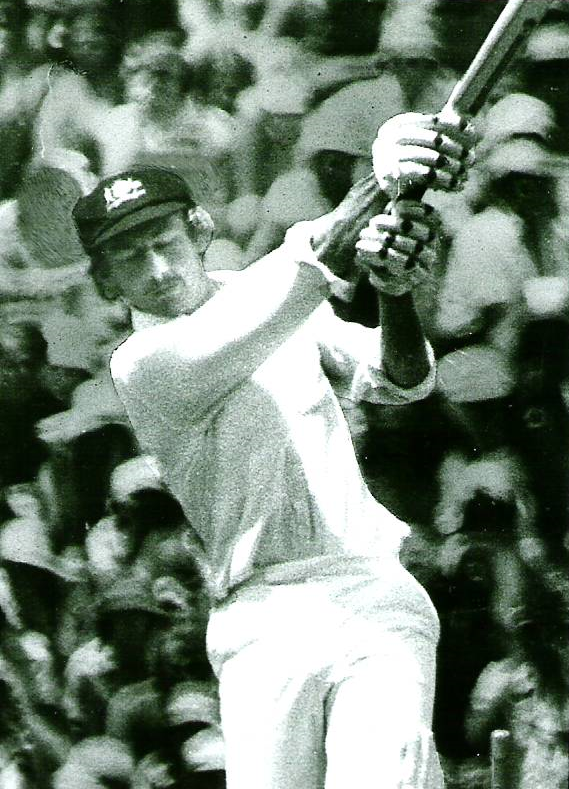
Graeme Beard, a right-hander and genuine all-rounder, smart anywhere in the field, able to bat in the first six and to bowl either sharpish medium pace seam or enterprising off-spin, came to the Club the season after Davis, also as a former International and current Shield player.
In season 1981/82, due to his NSW duties, he played only seven matches but in 1982/83, a full Grade season, he demonstrated that he was still the leading all-rounder in NSW. He scored 360 runs @ 32.73, including 84 v Wests, 56* v Cumberland and 50 v Randwick. With the ball he took 57 wickets @ 11.26, including 6/41 and 6/14 in the outright win against Balmain, 5/31 v St George and 5/45 v Wests.
He played a leading role in the First Grade Premiership win: in the Final against Bankstown he scored 45 and took 3/30. He won the Penrith Cricket Club Player of the Year Award that season. He played three Tests (in Pakistan) scoring 114 runs @ 22.80, highest score 49, and took one wicket. For NSW he scored 1091 runs @ 24.79 and took 100 wickets @ 26.82.
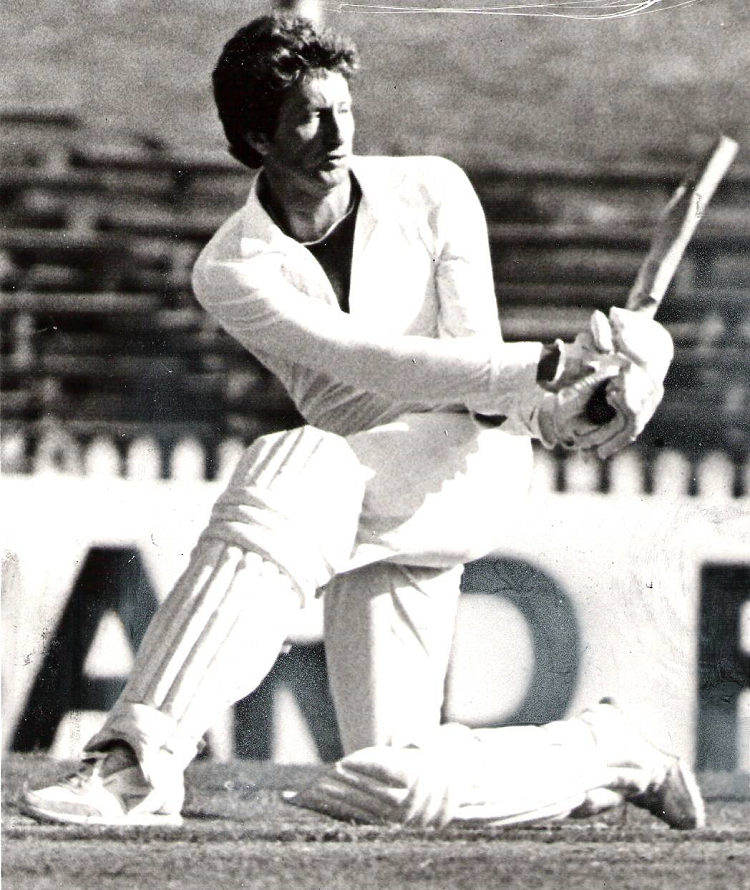
BOB CLARENCE
Tall, lean and with a rather loping gait, Bob Clarence was a handy and heady all-rounder, one of those bread-and-butter cricketers upon whom many Grade Clubs depend.
He captained the Seconds for two seasons and managed the Poidevin-Gray for six seasons. He was a member of Management from 1974/75 to 1982/83, Secretary from 1977/78 to 1982/83 and a long term Delegate to the NSWCA.
His earlier cricket was with the NDCA where he played for St Marys and later Werrington School of Arts. He was graded Seconds in the Club’s first season and played continuously for ten seasons in Firsts (266 runs @ 12.09, one wicket @ 17.00), Seconds (2457 runs @ 18.61, 131 wickets @ 19.22) and Thirds (76 runs @ 12.66, five wickets @ 18.00).
For the Club he scored 2799 runs @ 17.49, took 137 wickets @ 19.09 and took 66 catches. His best season with the bat was 1979/80 when he scored 451 runs @ 20.05, including 103 v Gordon. Five times he grabbed five-wicket hauls, including 7/41 v Balmain (1980/81), 6/50 v Balmain (1982/83) and 6/24 v Manly (1979/80).
He shared three Second Grade Record Partnerships: First with Rob Stevens, 141 v Sydney Uni (1979/80); Third with Stevens, 95 v North Sydney (1977/78); Fourth with Trevor Bayliss, 83 v North Sydney (1981/82). He won the Trevor Wholohan Fielding Award in 1979/80.


